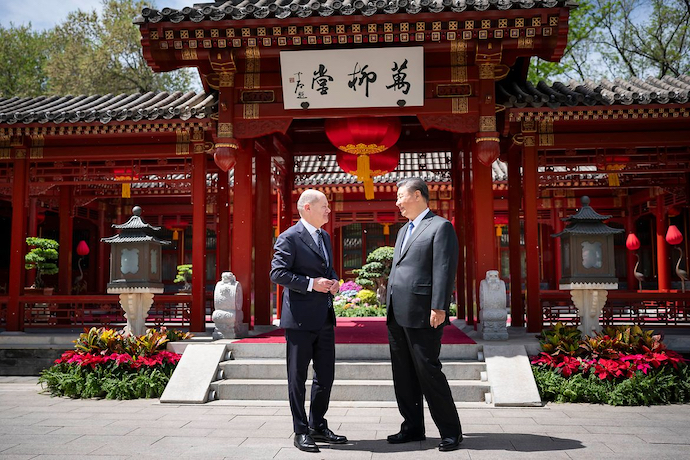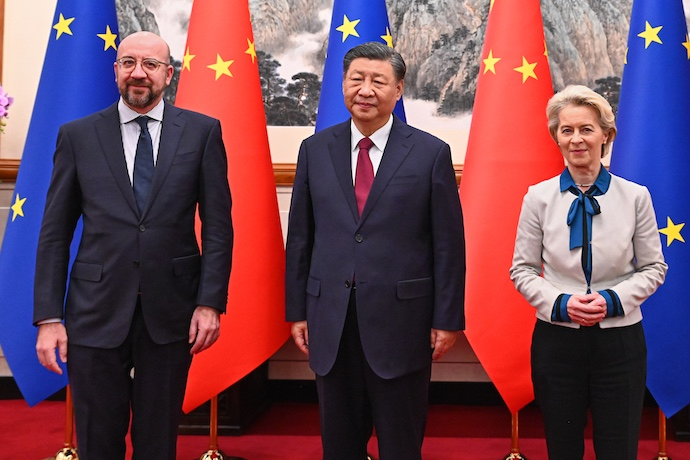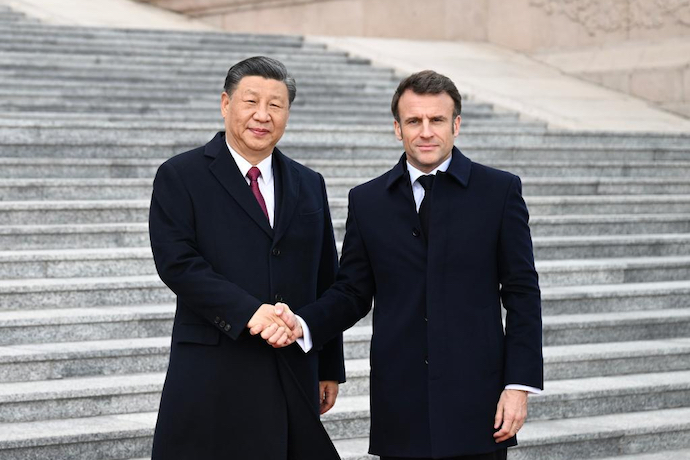The Platform
Latest Articles
by Sohail Mahmood
by James Carlini
by Akbar Sapie
by Muhammad Zain Ul Abdin
by Manish Rai
by Miskilu Aminat Olaitan
by Mohammad Ibrahim Fheili
by Facundo Almada Abreu
by Theo Casablanca
by Sohail Mahmood
by James Carlini
by Akbar Sapie
by Muhammad Zain Ul Abdin
by Manish Rai
by Miskilu Aminat Olaitan
by Mohammad Ibrahim Fheili
by Facundo Almada Abreu
by Theo Casablanca
EU Trade Policy towards China: New Roots of Conflict?
05.06.2024
A trade war between China and Europe would be crippling economically. Good news, it’s not inevitable.
The European Union’s relationship with China has long been characterized by a complex interdependence that balances cooperation with competition. Central to this relationship is the arena of trade, where China has emerged as the EU’s largest trading partner in goods and a significant recipient of European foreign direct investment. However, recent years have seen a growing strain in this relationship, influenced by shifts in global geopolitics, economic imbalances, and disparities in regulatory frameworks between these two global actors.
The increasing politicization of trade policies has added complexity to this dynamic, raising the specter of potential conflicts that could be detrimental to both parties, hindering their economic development and the achievement of their respective goals. It is therefore critical to maintain open lines of communication through continued dialogue to manage and resolve these differences.

The EU and China established diplomatic ties in 1975, but their trade relationship gained significant momentum after China joined the World Trade Organization in 2001. Over the past two years, EU-China trade has experienced substantial growth, with year-on-year increases of 20 percent in both 2021 and 2022, following a modest 4.6 percent increase in 2020.
The economies of the EU and China are closely intertwined, with a substantial daily trade in goods amounting to €2.3 billion. Despite this growth, the EU’s trade deficit with China has spiked, reaching nearly €400 billion in 2022. The EU attributes this imbalance primarily to China, citing restricted market access for foreign companies and significant subsidies provided by Beijing to its domestic producers in key sectors such as electric vehicles, solar panels, batteries, and wind energy.
In response, the EU has initiated several anti-subsidy investigations against Chinese products. For instance, a recent anti-subsidy investigation targeting Chinese electric vehicles was launched by the EU, despite strong objections from China. There is also potential for similar investigations in the sectors of medical devices and wind turbines, which could lead to increased import tariffs or other trade-restrictive measures. The European Commission has confirmed it will impose provisional anti-dumping duties on some plastic imports from China. During the 10th EU China High-Level Economic and Trade Dialogue last year, the EU raised concerns about market barriers that affect European products, issues related to cross-border data flows under the Chinese anti-espionage law, and export controls.
Moreover, the EU has advocated for stricter controls over the transfer of critical technologies. The bloc accuses China of forcing technology transfers through government-imposed laws, making it a prerequisite for companies to operate in the country. This alleged practice creates an environment of unfair competition and is seen as a direct violation of international trade laws. However, Beijing has rejected these claims, accusing the EU of trade protectionism, which, it argues, undermines the positive momentum of bilateral trade cooperation.

This hardline stance on trade from the EU towards China cannot be separated from recent developments in global politics. This shift was underscored by a significant speech from the president of the European Commission, Ursula von der Leyen, before she visited China, where she emphasized that “security and control now take precedence over the principles of free markets and open trade.” This resolve was also evident during the EU-China Summit in 2023, where she addressed several politically sensitive issues, including the Russia-Ukraine war, concerns about Chinese companies circumventing sanctions against Moscow, developments in the Taiwan Strait and the South China Sea, human rights concerns, and sanctions against members of the European Parliament. Concurrently, EU member states have felt increasing pressure from Washington to counter Chinese activities, especially in managing Chinese technological advancements.
The result is visible in the EU’s policy of “de-risking,” which encompasses both economic and diplomatic strategies. In a statement released in June 2023, Brussels expressed its commitment to reducing critical dependencies and vulnerabilities in supply chains, implementing de-risking and diversification measures where needed. In terms of diplomatic de-risking, President Von der Leyen explained that this strategy allows the EU to maintain a firm stance on issues such as Russia while keeping trade channels open and fostering dialogues on global concerns.
China has expressed dissatisfaction with these trade remedies from its largest trading partner and has voiced concerns over their consequences on the EU-China trade partnership. China’s top diplomat Wang Yi, in response to the EU’s anti-subsidy investigation, urged the EU to “avoid protectionist behavior and be prudent in the use of trade remedy measures.”
Many Chinese scholars have accused the European bloc of politicizing trade policy, which they argue will not bode well for EU-China trade relations in the future. Moreover, the adoption of a rigid and irrational stance on trade issues with China is becoming a popular strategy among a faction of hardline politicians in Europe, ostensibly aimed at garnering political support in the forthcoming European Parliament elections in June. If this situation persists, China might respond with more restrictive trade policies in a tit-for-tat fashion. The increasing politicization and adoption of stringent trade policies by both parties may cultivate the seeds of a new conflict, and the ensuing consequences could be detrimental for all involved.

The EU and China share a trade partnership intricately interwoven, where disruptions could reverberate not just economically but politically. The EU is particularly vulnerable, heavily reliant on China for essential raw materials like rare earth elements (REEs), crucial for technologies in clean energy and electronics. Europe’s dependency on China for 98 percent of specific REEs used in technologies for wind power, hydrogen storage, and batteries highlights a critical chokepoint. A conflict could jeopardize this access, threatening European industries and their clean energy transition.
Amid the Russia-Ukraine war, the EU’s push towards decarbonization has transformed from an environmental initiative to a security imperative. The EU aims for carbon neutrality with a strategy heavily reliant on clean energy technologies, predominantly imported from China. Projections indicate that by 2030, about 60 percent of China’s clean energy technology production will target the global market. A trade conflict could undermine these climate-related goals, affecting both regions adversely.
Increased rivalry could see China facing higher tariffs and non-tariff barriers, disrupting trade flow, and deterring EU investments critical for China’s technological and economic progression. Despite a recent decline, EU investments remain substantial, totaling $10 billion in 2022. Over the past two decades, the cumulative EU investment in China has been estimated between €160 billion and €170 billion.
The stakes are particularly high in industries like electric vehicles, increasingly popular in European markets. A trade war could impair Chinese competitiveness in this strategic sector, with broader economic ramifications. Beyond economics, the political and global implications of a trade war are profound. An escalating conflict could sour overall EU-China relations, hampering cooperation on global challenges like climate change and security, crucial for worldwide progress. Both regions have committed to achieving climate neutrality by 2050 and 2060, respectively, and have reiterated their commitment through joint climate statements and the establishment of the High Level Dialogue on Environment and Climate (HECD).
A trade war could also exacerbate geopolitical tensions, leading to rival economic blocs with distinct rules and standards, reminiscent of Cold War-era politics. This polarization could destabilize international relations and undermine global cooperation and stability.
Despite existing tensions, a full-scale trade war remains unlikely. The EU’s approach of ‘de-risking’ rather than ‘decoupling’ from China underscores the recognition of the economic risks of severing ties with the world’s second-largest economy. Ongoing high-level engagements, such as German Chancellor Olaf Scholz’s visit to China in November 2022 and China’s Wang Yi’s European tour in February 2023, alongside the 24th EU-China summit in Beijing at the end of 2023, highlight efforts to maintain a constructive dialogue while addressing differences.
The EU’s relationship with China is nuanced, with individual member states like France pursuing stronger bilateral trade relations. President Emmanuel Macron’s state visit to China, accompanied by French business leaders, exemplifies national interests sometimes overshadowing collective EU concerns.
In sum, the EU-China trade relationship, once a beacon of cooperation, now navigates turbulent waters stirred by shifting geopolitics, economic imbalances, and regulatory disparities. The EU’s evolving stance, prioritizing security over free trade, poses risks of conflict, threatening access to essential resources and investments. While a complete decoupling appears unlikely, maintaining open communication and multilateral cooperation, particularly in addressing systemic issues like market access, is essential. Navigating these complexities requires a delicate balance of security and economic interdependence to avoid a destabilizing trade war that could deepen global tensions.
Muhammad Estiak Hussian is a Research Assistant at the KRF Center for Bangladesh and Global Affairs (CBGA). He holds a BSS and MSS from the Department of International Relations, University of Dhaka. His main research interests are Bangladesh's foreign policy, regional politics of South Asia, refugees and migration.
